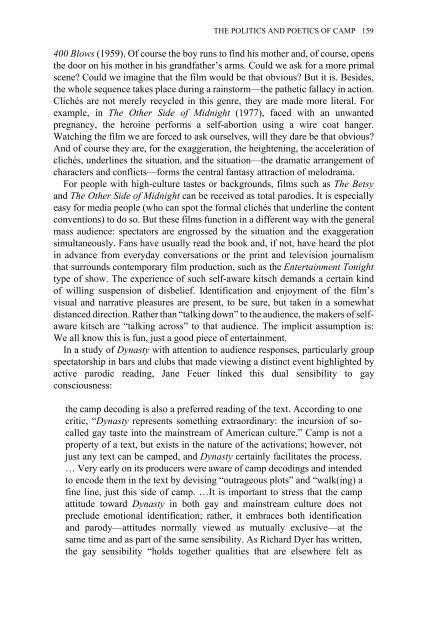Edited by Moe Meyer - Get a Free Blog
Edited by Moe Meyer - Get a Free Blog
Edited by Moe Meyer - Get a Free Blog
Create successful ePaper yourself
Turn your PDF publications into a flip-book with our unique Google optimized e-Paper software.
THE POLITICS AND POETICS OF CAMP 159<br />
400 Blows (1959). Of course the boy runs to find his mother and, of course, opens<br />
the door on his mother in his grandfather’s arms. Could we ask for a more primal<br />
scene? Could we imagine that the film would be that obvious? But it is. Besides,<br />
the whole sequence takes place during a rainstorm—the pathetic fallacy in action.<br />
Clichés are not merely recycled in this genre, they are made more literal. For<br />
example, in The Other Side of Midnight (1977), faced with an unwanted<br />
pregnancy, the heroine performs a self-abortion using a wire coat hanger.<br />
Watching the film we are forced to ask ourselves, will they dare be that obvious?<br />
And of course they are, for the exaggeration, the heightening, the acceleration of<br />
clichés, underlines the situation, and the situation—the dramatic arrangement of<br />
characters and conflicts—forms the central fantasy attraction of melodrama.<br />
For people with high-culture tastes or backgrounds, films such as The Betsy<br />
and The Other Side of Midnight can be received as total parodies. It is especially<br />
easy for media people (who can spot the formal clichés that underline the content<br />
conventions) to do so. But these films function in a different way with the general<br />
mass audience: spectators are engrossed <strong>by</strong> the situation and the exaggeration<br />
simultaneously. Fans have usually read the book and, if not, have heard the plot<br />
in advance from everyday conversations or the print and television journalism<br />
that surrounds contemporary film production, such as the Entertainment Tonight<br />
type of show. The experience of such self-aware kitsch demands a certain kind<br />
of willing suspension of disbelief. Identification and enjoyment of the film’s<br />
visual and narrative pleasures are present, to be sure, but taken in a somewhat<br />
distanced direction. Rather than “talking down” to the audience, the makers of selfaware<br />
kitsch are “talking across” to that audience. The implicit assumption is:<br />
We all know this is fun, just a good piece of entertainment.<br />
In a study of Dynasty with attention to audience responses, particularly group<br />
spectatorship in bars and clubs that made viewing a distinct event highlighted <strong>by</strong><br />
active parodic reading, Jane Feuer linked this dual sensibility to gay<br />
consciousness:<br />
the camp decoding is also a preferred reading of the text. According to one<br />
critic, “Dynasty represents something extraordinary: the incursion of socalled<br />
gay taste into the mainstream of American culture.” Camp is not a<br />
property of a text, but exists in the nature of the activations; however, not<br />
just any text can be camped, and Dynasty certainly facilitates the process.<br />
… Very early on its producers were aware of camp decodings and intended<br />
to encode them in the text <strong>by</strong> devising “outrageous plots” and “walk(ing) a<br />
fine line, just this side of camp. …It is important to stress that the camp<br />
attitude toward Dynasty in both gay and mainstream culture does not<br />
preclude emotional identification; rather, it embraces both identification<br />
and parody—attitudes normally viewed as mutually exclusive—at the<br />
same time and as part of the same sensibility. As Richard Dyer has written,<br />
the gay sensibility “holds together qualities that are elsewhere felt as


